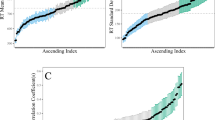Abstract
In psychological research, one often aims at explaining individual differences in S-R profiles, that is, individual differences in the responses (R) with which people react to specific stimuli (S). To this end, researchers often postulate an underlying sequential process, which boils down to the specification of a set of mediating variables (M) and the processes that link these mediating variables to the stimuli and responses under study. Obviously, a crucial task is to chart how the individual differences in the S-R profiles are caused by individual differences in the S-M link and/or by individual differences in the M-R link. In this paper we propose a new model, called CLASSI, which was explicitly designed for this task. In particular, the key principle of CLASSI consists of reducing the S, M, and R nodes of a sequential process to a few mutually exclusive types and inducing an S-M and an M-R person typology from the data, with the S-M person types being characterized in terms of if S type then M type rules and the M-R person types in terms of if M type then R type rules. As such, the S-M and M-R person types and their associated if–then rules represent the important individual differences in the S-M and M-R links of the sequential process under study. An algorithm to fit the CLASSI model is described and evaluated in a simulation study. An application of CLASSI to data from the behavioral domain of anger and sadness is discussed. Finally, we relate CLASSI to other methods and discuss possible extensions.
Similar content being viewed by others
References
Aarts, E.H., & Lenstra, J.K. (1997). Local search in combinatorial optimization. Chichester: Wiley.
Ajzen, I. (1991). The theory of planned behavior. Organizational Behavior and Human Decision Processes, 50, 179–211.
Brusco, M.J. (2001). A simulated annealing heuristic for unidimensional and multidimensional (city-block) scaling of symmetric proximity matrices. Journal of Classification, 18, 3–33.
Ceulemans, E., & Kiers, H.A.L. (2006). Selecting among three-mode principal component models of different types and complexities: A numerical convex hull-based method. British Journal of Mathematical and Statistical Psychology, 59, 133–150.
Ceulemans, E., Van Mechelen, I., & Kuppens, P. (2004). Adapting the formal to the substantive: Constrained Tucker3-Hiclas. Journal of Classification, 21, 19–50.
Ceulemans, E., Van Mechelen, I., & Leenen, I. (in press). The local minima problem in hierarchical classes analysis: An evaluation of a simulated annealing algorithm and various multistart procedures. Psychometrika.
Frijda, N.H., Kuipers, P., & ter Schure, E. (1989). Relations among emotion, appraisal, and emotional action readiness. Journal of Personality and Social Psychology, 57, 212–228.
Mischel, W., & Shoda, Y. (1995). A cognitive-affective system-theory of personality—Reconceptualizing situations, dispositions, dynamics, and invariance in personality structure. Psychological Review, 102, 246–268.
Mischel, W., & Shoda, Y. (1998). Reconciling processing dynamics and personality dispositions. Annual Review of Personality, 49, 229–258.
Murillo, A., Vera, J.F., & Heiser, W.J. (2005). A permutation-translation simulated annealing algorithm for l 1 and l 2 unidimensional scaling. Journal of Classification, 22, 119–138.
Schepers, J., Van Mechelen, I., & Ceulemans, E. (2006). Three-mode partitioning. Computational Statistics and Data Analysis, 51, 1623–1642.
Schepers, J., Ceulemans, E., & Van Mechelen, I. (2007). Selecting among multi-mode partitioning models of different complexities: A comparison of four model selection criteria. Manuscript submitted for publication.
Scherer, K.R. (2001). The nature and study of appraisal: A review of the issues. In K.R. Scherer, A. Schorr, & T. Johnstone (Eds.), Appraisal processes in emotion: Theory, methods, research (pp. 369–392). New York: Oxford University Press.
Smilde, A.K., & Kiers, H.A.L. (1999). Multiway covariates regression models. Journal of Chemometrics, 13, 31–48.
Trejos, J., & Castillo, W. (2000). Simulated annealing optimization for two-mode partitioning. In W. Gaul & R. Decker (Eds.), Classification and information at the turn of the millennium (pp. 135–142). Heidelberg: Springer.
Van Mechelen, I., & De Boeck, P. (1989). Implicit taxonomy in psychiatric diagnosis: A case study. Journal of Social and Clinical Psychology, 8, 276–287.
Van Rosmalen, J., Groenen, P.J.F., Trejos, J., & Castillo, W. (2007). Global optimization strategies for two-mode clustering. Manuscript submitted for publication.
Vansteelandt, K., & Van Mechelen, I. (2006). Individual differences in anger and sadness: In pursuit of active situational features and psychological processes. Journal of Personality, 74, 871–910.
Author information
Authors and Affiliations
Corresponding author
Additional information
The first author is a post-doctoral fellow of the Fund for Scientific Research—Flanders (Belgium). The research reported in this paper was partially supported by the Research Council of K.U. Leuven (GOA/05/04).
Rights and permissions
About this article
Cite this article
Ceulemans, E., Van Mechelen, I. CLASSI: A classification model for the study of sequential processes and individual differences therein. Psychometrika 73, 107–124 (2008). https://doi.org/10.1007/s11336-007-9024-1
Received:
Accepted:
Published:
Issue Date:
DOI: https://doi.org/10.1007/s11336-007-9024-1




